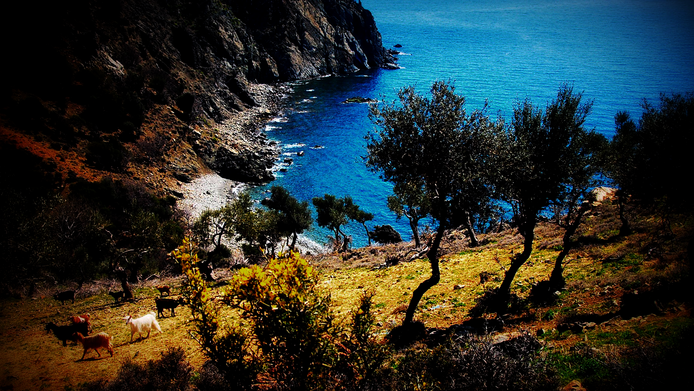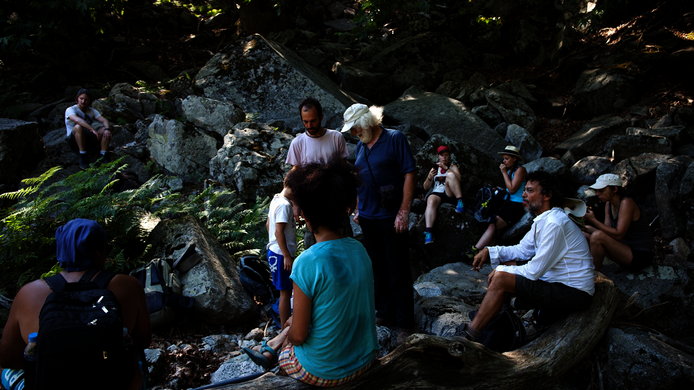Waste, goats and a research project

In September 2017, the Greek island of Samothrace was hit by a storm of unprecedented magnitude. On this small island in the north-eastern corner of the Aegean not far from Turkey, roads quickly turned into rivers, shops and medical centres were flooded, and the water supply collapsed. – It had all started with a waste problem. Years ago, the social ecologist Marina Fischer-Kowalski was approached by committed women from the island on a camp site. The women ran a campaign “Samothrace in Action” which protested against the burning of waste left by tourists – around 30,000 a year – in a field. Fischer-Kowalski was intrigued and looked into the matter. An interdisciplinary team led by Fischer-Kowalski started to investigate the connections between ecological, social and economic factors on the island, identifying areas where the balance of this system could be upset. Examples include waste disposal systems or the natural disaster of 2017, the dramatic effects of which were caused partly by overgrazing.
Bottom-up waste separation
“The waste issue is definitely one of these tipping points and a chronic problem on the island,” says Kowalski, who is the founder of the Vienna Institute for Social Ecology, which is affiliated with the University of Natural Resources and Applied Life Sciences in Vienna. Because of the many watercourses in what was formerly a volcanic area, it is difficult to find areas suitable for landfills and sewage drainage pits. This is why waste needed to be transported to the mainland, which is associated with high costs. While theoretically prescribed, waste separation does not work in practice, although it could save a lot of money. “We took a closer look at what ends up in the bins and found that half of it is organic waste,” says Fischer-Kowalski. This can be used to produce compost, as is now being done in some school projects initiated by the research team. Based on many years of experience in dealing with sustainability issues, Fischer-Kowalski knows that cultural change cannot simply be imposed from the outside. Hence, to deal with the problems in Samothrace, the researcher sought contact with the population from the outset and she also initiated a citizen science project with the support of the FWF. In some cases, for instance when it comes to waste issues, it is helpful to start with the very young in order to initiate learning processes in the population.
Overgrazing with drastic consequences
Overgrazing was another critical point the researchers identified. Again, talking to the numerous small farmers on the island was an important part of the project. After the team had invested a great deal of effort in working out detailed facts and figures about the situation of the farmers, the numbers of goats and sheep and the related EU subsidies, they started educating the farmers about the consequences of drastic overgrazing and involving them in remedial measures. Between 1960 and 2000, the number of sheep and goats on the island had increased from 15,000 to 75,000, partly as a consequence of subsidies and non-implemented EU regulations. As a result, the pastures had been stripped bare and the animals were starving and bearing fewer offspring – which meanwhile has reduced the animal population by 40 per cent – and relocated to the mountains, where they devastated the young tree population.
Together with forestry experts from the University of Natural Resources and Applied Life Sciences, the research team recently investigated the condition of the oak forests in the mountainous regions, which are thousands of years old. “We have also involved the local population,” says Fischer-Kowalski, “urging people to go up into the mountains to see for themselves.” According to the scientist, there was vivid participation by pupils, but also by adults – hunters, for instance – and the result of the investigations was sobering: “There is just about a decade left to prevent the forest from dying.”
A biosphere reserve to secure the future
This is a real threat to one of the last islands of the archipelago boasting unspoilt nature, with its 500 waterfalls and fantastic pebble beaches. It could also jeopardise an ambitious project: In 2011, the population, tourists, local policy-makers and the Greek Ministry of the Environment already supported Fischer-Kowalski's initiative to transform the island into a Biosphere Reserve. “There are 600 such reserves worldwide,” explains Fischer-Kowalski, who is a member of the Austrian UNESCO Committee for the Biosphere Programme and scientific advisor for this process on Samothrace. “This would give the island a new identity that melds conservation and sustainable development.” Two-thirds of Samothrace is already a Natura 2000 site, but the submission to UNESCO for transformation into a Biosphere Reserve has revealed a few unforeseen management deficiencies that needed to be resolved first. After two applications had been rejected, the legal responsibility for Natura 2000 has now progressed far enough to give the researcher hope “that we can submit another application this year, and I think it will work this time.” - But there is yet another danger lurking on the horizon for the island which is so rich in natural and cultural assets. An industrial consortium is planning to build a huge wind farm on the mountain range of the island. “That would be a disaster,” warns the researcher.
Personal details Marina Fischer-Kowalski is a sociologist, professor emeritus and founder of the Institute for Social Ecology in Vienna in 1987. Her research focuses on social ecology, sustainability, environmental sociology and resource use. She is a scientific member of numerous expert committees such as the International Resource Panel of the United Nations and the Austrian Committee of the UNESCO Man and Biosphere Program (MAB) at the Austrian Academy of Sciences.
Project website: http://sustainable-samothraki.net/ Documentary film: Wings of Samothrace (2018) documents the ambitious research project that aims to help islanders develop visions for a sustainable future for Samothrace.
Publications






